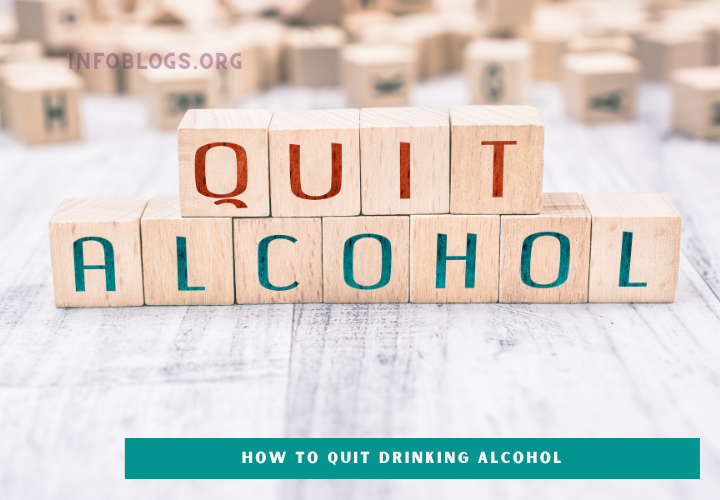In today's article we will learn how to quit drinking alcohol.
Alcohol consumption is a major issue in the United States and can lead to a range of health problems, including liver disease and addiction. If you are looking to stop drinking alcohol, it is important to understand why it's necessary and how to do so safely. Today we will see why it’s important to limit or stop your alcohol intake, as well as tips on how you can reduce your drinking.
The first step towards reducing alcohol consumption is understanding the risks associated with its use. Alcohol affects each person differently; for some, even moderate amounts can be dangerous or addictive. It’s also important to consider the long-term effects of excessive drinking, like poor physical health or damage to relationships. Understanding these risks will help motivate you when creating a plan for stopping alcoholic drinks altogether.
Understand Why: Reasons for Quitting
If you're considering quitting drinking alcohol, it's important to understand why. There are a few key reasons why people choose to stop consuming alcohol and these should be taken into consideration before making such a life-altering decision. From physical and mental health benefits, to financial savings or religious beliefs, many individuals have their own motivations for wanting to quit drinking.
Physical and mental health benefits are perhaps the most commonplace reasons for quitting alcohol. People who drink heavily can experience long-term damage to their livers as well as other organs in the body, leading to potential serious health issues down the line. Furthermore, those who consume large amounts of alcohol often suffer from depression and anxiety due to its depressant effects; when they stop drinking altogether, these feelings may subside significantly or even disappear completely.
Develop a Plan: Strategies & Goals
Developing a plan to stop drinking alcohol can be essential for anyone who is looking for support and accountability in their journey to sobriety. A plan that clearly outlines strategies and goals helps to provide structure and focus throughout the process. It also encourages individuals by providing rewards along the way, as well as a timeline to measure progress against.
Creating a personalized plan involves setting realistic goals, identifying what needs to be changed in order to achieve them, and then finding ways of making those changes possible. This requires taking an honest look at why you chose to drink in the first place, any potential triggers that could cause relapse, and any obstacles that may arise during this transition period. Strategies need to be developed for dealing with these issues head-on; such as avoiding certain people or places where alcohol is consumed.
Seek Support: Friends, Family & Professionals
When it comes to making the decision to stop drinking alcohol, seeking out support is crucial. Friends and family members can provide an invaluable level of understanding and connection that makes the process easier. Professionals are also available to assist with the transition back into sobriety.
Having a strong network of supportive people surrounding you throughout your journey can make all the difference. From someone offering encouraging words when you’re feeling down, to joining you in activities while reducing cravings – having people by your side is essential for success. Friends and family should be well-informed on what your goals are, as well as how they can help support them. It’s important to remember that although their intentions may come from a good place, some tips or advice may not be helpful or even appropriate for your situation.
Use Alternatives: Healthy Habits & Hobbies
If you're considering cutting back on your drinking or quitting alcohol altogether, it's important to find healthy alternatives. Making healthy habits and hobbies part of your life can help you stay away from the bottle and still enjoy yourself. From outdoor activities like running or biking to creative pastimes like painting or cooking, there are plenty of options for having fun without relying on alcohol.
Start by making a list of activities that you would enjoy doing when the urge to drink arises. If exercise is more your thing, consider joining a local sports team or signing up for classes at the gym. You can also attend outdoor events in your area that don't involve drinking such as art shows, festivals, and concerts. For those who prefer quieter activities, take up reading, writing, knitting or even pottery classes!
Avoid Triggers: Identifying Urges
Avoiding triggers is a key part of the process when it comes to giving up drinking alcohol. It can be hard to identify and understand what these triggers are, but with the right information and support, you can learn how to control them.
Triggers are anything that makes you want to drink alcohol: situations, thoughts or feelings. This could include environments such as bars or pubs, spending time with friends who regularly drink or feeling overwhelmed by stress. Identifying your personal triggers can help you take steps to avoid them in future and reduce cravings for alcohol.
You can also use coping strategies such as distraction techniques, deep breathing exercises and creative activities like painting or writing which will help you manage urges in a healthier way than drinking alcohol.
Manage Cravings: Coping Strategies
Manage Cravings: Coping Strategies: For anyone trying to cut back on their drinking, cravings can be one of the biggest challenges. Overcoming cravings and learning how to manage them is an important part of quitting alcohol. There are a variety of strategies that can help individuals combat their cravings and stay on the healthy path they have set for themselves.
One effective strategy is mindfulness meditation. Mindfulness meditation teaches people how to become aware of their thoughts, feelings, and physical sensations in order to better understand and manage them. This type of meditation can help individuals recognize when a craving occurs, allowing them to step back from it rather than being drawn into it. Other strategies such as deep breathing exercises or distraction techniques may also be helpful in managing cravings by providing an outlet for stress or boredom which often trigger drinking episodes.
Conclusion: Moving Forward
As with all lifestyle changes, quitting alcohol is not easy. However, with determination and support, it is possible to stop drinking and move forward in a healthier direction. There are a few key steps to take that can help you quit drinking for good. Let's summarize what we learnt today.
The first step is to develop an understanding of why you want to quit drinking. This could be for health reasons, personal goals or financial savings. Once the motivation is there, create an action plan and stick to it. Reach out for support from family members or friends who can provide encouragement when things get tough. It's also important to find alternate activities that will keep your mind occupied during times of temptation – such as exercise or hobbies like reading or cooking. Finally, be sure to stay aware of any underlying issues or triggers that lead you towards alcohol consumption so that proper measures can be taken in order prevent future relapse.


